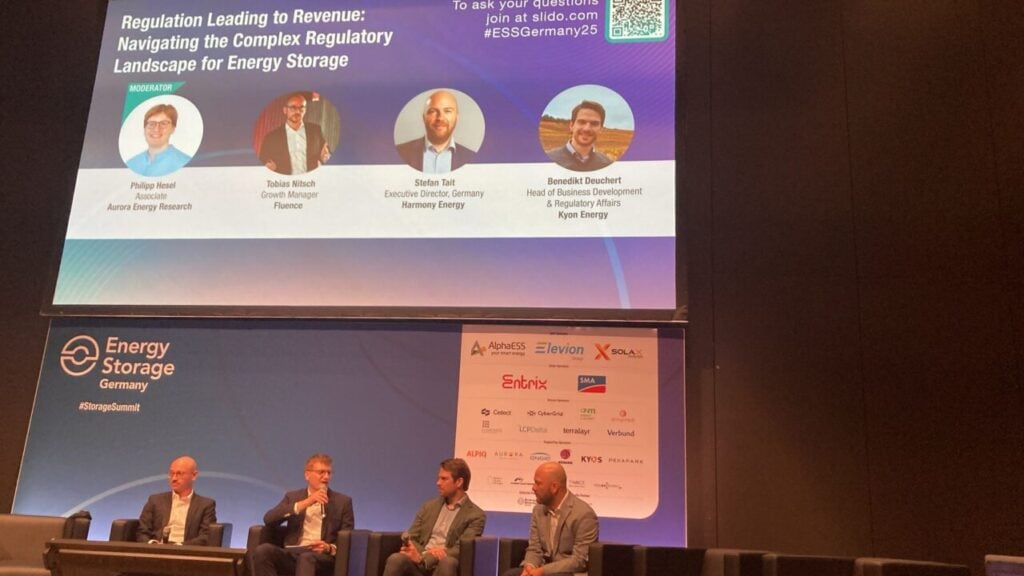
Germany is regularly described as Europe’s hottest market for energy storage, but its current regulatory framework is holding it back and changes down the line are also a concern.
That was the message from the opening panel at our publisher Solar Media’s inaugural Energy Storage Summit Germany, which kicked off today (3 June) in Stuttgart.
The event is co-located with Solar Media parent company Informa’s Battery Show Europe 2025, and the two events run side by side for three days, bringing together European upstream battery and downstream energy storage industry executives.
Executives from Aurora Energy Research, system integrator Fluence and developers Harmony Energy and Kyon Energy sat on Day One’s keynote panel to discuss the current and future regulatory environment for large-scale energy storage.
Try Premium for just $1
- Full premium access for the first month at only $1
- Converts to an annual rate after 30 days unless cancelled
- Cancel anytime during the trial period
Premium Benefits
- Expert industry analysis and interviews
- Digital access to PV Tech Power journal
- Exclusive event discounts
Or get the full Premium subscription right away
Or continue reading this article for free
How difficult is it?
After panellists were asked to give their ‘ratings’ of Germany’s current regulatory environment, Benedikt Deuchert, head of business development and regulatory affairs for Kyon Energy, kicked things off by defending his rating, which was higher than those of fellow panellists, Harmony’s Germany executive director Stefan Tait and Fluence growth manager Tobias Nitsch.
“It’s regularly described as the hottest market in Europe, so it would be strange if the regulatory landscape was so bad? It works nicely within the current environment. Of course, there’s some trouble ahead but projects making it to market now have it good,” Deutchert said.
Tait responded with an overview of some of the big challenges: “I feel frustration, we’ve been in the market for two years. Grid connection, permitting are still huge topics. It’s frustrating to not get replies or wait a year to get a response to grid connection requests.”
The ‘discriminatory’ BKZ
The first big topic of discussion was the BKZ. This is a fee that battery energy storage system (BESS) developers and other big resources that can draw power from the grid must pay distribution system operators (DSOs) before or during construction to compensate for the grid infrastructure they require.
Some DSOs don’t charge one, others charge as high as €140 (US$160) per kW, and Aurora calculated that it can reduce the internal rate of return (IRR) for a BESS project by up to four percentage points, said moderator Philipp Hesel, principal at the research firm.
Kyon has actually gone to court to protest the BKZ for discrimination, for a third time, arguing that BESS assets are comparable to legacy power plants (which don’t pay) and BESS’ load patterns are not like conventional consumer demand. Deuchert couldn’t discuss the proceedings, for which a decision will come in mid-July, but explained why the company had done it.
“We’re waiting for result, it won’t be an easy one. We succeeded in the second instance, but not a guarantee we’ll win in the third,” he said.
“Our claim is that storage is mostly comparable to existing power plants like gas and coal, and they don’t pay the BKZ. We are also load, but our load is different to other load. It is reactive only to the prices. It behaves in a way that means it should not pay for usage of that infrastructure.”
Harmony’s Tait explained how the BKZ had affected development: “Developers would initially look for a low BKZ area, then the battery prices dropped and business case looked better. Then there was a feeling that the BKZ would change anyway so it became less of a factor.”
“An issue we are facing is early down payments for the BKZ, sometimes as high as 20%. That’s €5 million for a 300MW system, in mid-development. Maybe an oil and gas major can pay that, but not smaller players like us.”
Grid fees and flexible connections: good in principle but risky in practice
BESS projects in Germany built by 2029 are temporarily exempted from grid fees for charging and discharging, but many agree that a long-term solution is needed. As reported by Energy-Storage.news recently, industry regulator Bundesnetzagentur released a discussion paper around the need, and proposals, for a long-term reform of grid fees.
Hesel raised the topic of flexible grid connections, something many say can offer a solution to the issue of charging storage to charge and discharge from the grid, by limiting when it can do so in return for lower fees.
Fluence’s Nitsch said in principle it was good but often worked against storage: “Generally it should be good for storage. But currently, the way it is being applied is not that favourable to storage. There are very vague or crude definitions of ‘grid friendliness’ being applied. One DSO in Bavaria said it meant that BESS cannot discharge from 7am-5pm, all year. Many DSOs dont know what grid friendly means. How storage can help the grid changes day to day.”
Discussing the paper, Tait and Deuchert said aspects of it were positive but mostly it was concerning for those developing in Germany.
“The operator is saying we need to change the way we finance the costs of maintaining a stable grid, and they put out some options. Reading the paper I feel a tone saying that storage is a burden, it’s a cost and it needs to pay its way.”
“The proposals seem to be about restricting batteries, but it should be about incentivising certain behaviour, and better integrating batteries into the grid operators systems.”
Deuchert agreed: “The paper creates lots of risks for the business case. The grid tariff exemption for projects built before 2029 provided for the current storage buildout. I agree that storage seems to be seen as a threat to the system.”
“Flexible connection agreements might limit the problem, but wont unlock the potential of the battery.”
The capacity market (CM) also came up but we will save those comments for a separate article, following a session dedicated to the CM this afternoon.





